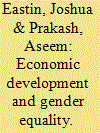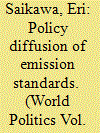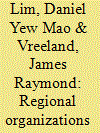|
|
|
Sort Order |
|
|
|
Items / Page
|
|
|
|
|
|
|
| Srl | Item |
| 1 |
ID:
119689


|
|
|
|
|
| Publication |
2013.
|
| Summary/Abstract |
This research note examines the relationship between economic development and gender equality. Drawing on the concept of the Kuznets curve, the authors hypothesize that the relationship between economic development and gender inequality is curvilinear (S shaped), with three distinct stages. In the first stage, economic development improves gender equality because it enables greater female labor-force participation. An independent income stream increases women's intrahousehold bargaining power. The opportunity to develop human capital confers greater political and social recognition. In the second stage, labor-force stratification and gender discrimination encourage divergent male/female income trajectories, which decrease the opportunity costs of female labor-force withdrawal and lend traction to social resistance against burgeoning gender norms. Consequently, there is a deceleration in initial equality gains. In the final stage, gender equality again improves, as greater educational participation and technological advancement provide new employment opportunities for women, increase the opportunity costs of staying home, and encourage the evolution of new social institutions and norms that overcome prior discriminatory practices. The authors find support for this argument in statistical tests of the relationship between economic development and gender equality on a panel of 146 developing countries for the period 1980-2005. They employ four indicators that reflect distinct dimensions of women's political, social, and economic status. They find economic development positively influences gender equality when per capita incomes are below $8,000-$10,000. These equality gains level off or decline slightly in the second stage, from $8,000-10,000 to about $25,000-$30,000. Beyond this level, economic development is again associated with improvements in gender equality. The key implication is that the effect of economic development on gender equality is contingent on the level of development. Policymakers and social activists should develop policy correctives to ensure that economic development confers improvements in gender equality across phases of development.
|
|
|
|
|
|
|
|
|
|
|
|
|
|
|
|
| 2 |
ID:
119688


|
|
|
|
|
| Publication |
2013.
|
| Summary/Abstract |
This article examines political trust and government satisfaction among migrant-origin individuals in Europe. While much of the current literature on migrant political attitudes focuses on the positive or negative ramifications of individual-level integration outcomes, the author takes a different approach. He claims that the best way to understand political trust and government satisfaction among migrant-origin individuals is through the strong positive correlation with trust and satisfaction among native-origin individuals in the same subnational region. One implication of this argument is that migrant-origin individuals' trust and satisfaction are closer to native-origin individuals living in the same subnational region than to migrants living elsewhere in Europe. The research provides a new perspective for understanding the broad contours of migrant integration and shifts the debate away from whether or not migrants have positive attitudes about European society. The fact that migrant- and native-origin individuals have similar levels of trust and satisfaction is suggestive of successful attitudinal integration, irrespective of whether those attitudes are positive or negative.
|
|
|
|
|
|
|
|
|
|
|
|
|
|
|
|
| 3 |
ID:
119687


|
|
|
|
|
| Publication |
2013.
|
| Summary/Abstract |
What explains the surprising growth of work-family policies in several West European countries? Much research on the welfare state emphasizes its institutional stickiness and immunity to major change. Yet, over the past two decades, governments in Germany, the Netherlands, and the United Kingdom have introduced important reforms to their welfare regimes, enacting paid leave schemes, expanded rights to part-time work, and greater investments in child care. A comparison of these countries reveals a similar sequence of political and policy change. Faced with growing electoral instability and the decline of core constituencies, party leaders sought to attract dealigning voter groups, such as women. This led them to introduce feminizing reforms of their party structures and adopt policies to support mothers' employment. In all three cases, women working within the parties played an important role in hatching or lobbying for these reforms. After comparing three countries that moved in a path-shifting direction, this article engages in a brief traveling exercise, examining whether a similar set of dynamics are lacking in two countries-Austria and Italy-that have moved more slowly in reforming these policies. Against the prevailing scholarly literature that emphasizes path dependence and slow-moving change, this article reveals the continued power of electoral politics in shaping redistributive policies.
|
|
|
|
|
|
|
|
|
|
|
|
|
|
|
|
| 4 |
ID:
119685


|
|
|
|
|
| Publication |
2013.
|
| Summary/Abstract |
In a dramatic example of policy diffusion, the past three decades have witnessed the spread of automobile emission standards throughout the world. Contrary to fears that global competition would produce a race to the bottom, there appears to be a race to the top, not only among rich countries but also among poor ones. Using econometric analysis of the adoption of automobile emission standards over the past twenty years for 129 countries, the author argues that this global diffusion results from countries' efforts to stay competitive in the international market. Due to the pressure from importing countries that have adopted stringent emission standards, even developing countries have rapidly moved to adopt rich country standards. The evidence shows that adoption of automobile emission standards correlates with an increase in the total value of automobile exports. Under some conditions, economic incentives in a global market can be a complement to environmental protection.
|
|
|
|
|
|
|
|
|
|
|
|
|
|
|
|
| 5 |
ID:
119686


|
|
|
|
|
| Publication |
2013.
|
| Summary/Abstract |
Do regional hegemons use their power in regional organizations to advance foreign policy objectives? The authors investigate whether Japan leverages its privileged position at the Asian Development Bank (adb) to facilitate project loans for the elected Asian members of the United Nations Security Council (UNSC), a platform from which it seeks to shape global affairs. Analyzing panel data of adb loan disbursements to twenty-four developing member-countries from 1968 to 2009, the authors find that temporary UNSC membership increases adb loans, particularly during the post-1985 period, when Japan asserted greater influence in multilateral organizations. They estimate an average increase of over 30 percent. Because of Japan's checkered history of imperialism, the adb provides a convenient mechanism by which the government can obfuscate favors for politically important countries. Acting through this regional organization enables Japan to reconcile a low-key approach to foreign affairs with the contradictory goal of global activism-leading without appearing unilateralist.
|
|
|
|
|
|
|
|
|
|
|
|
|
|
|
|
|
|
|
|
|